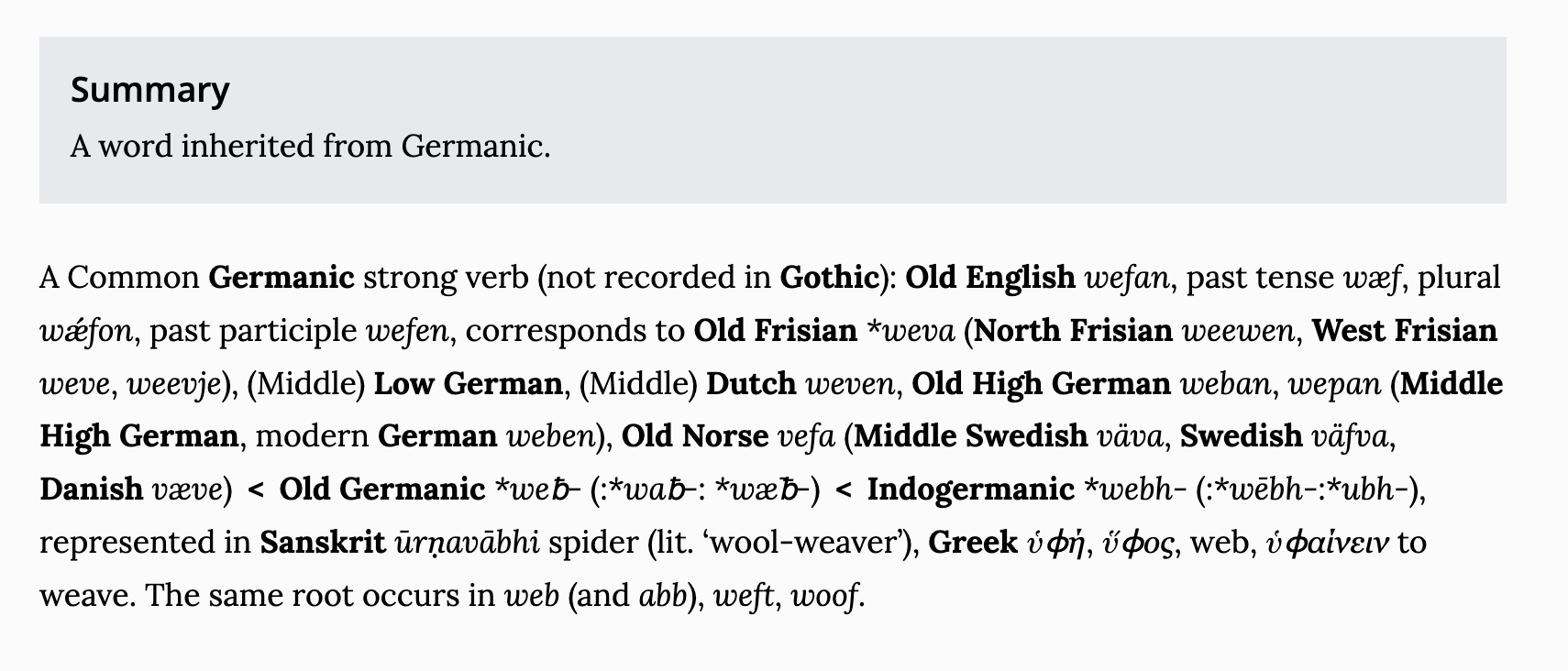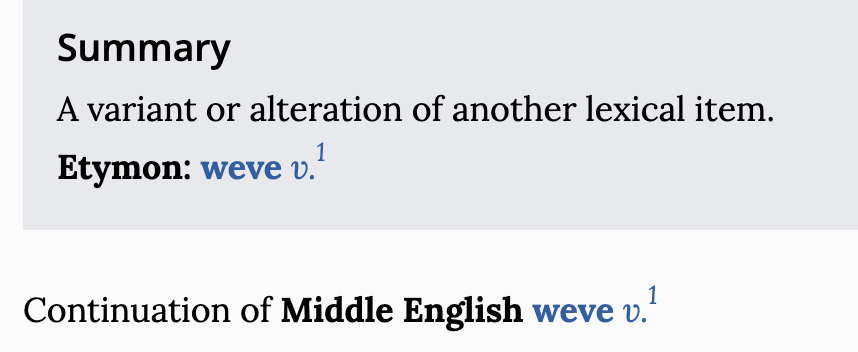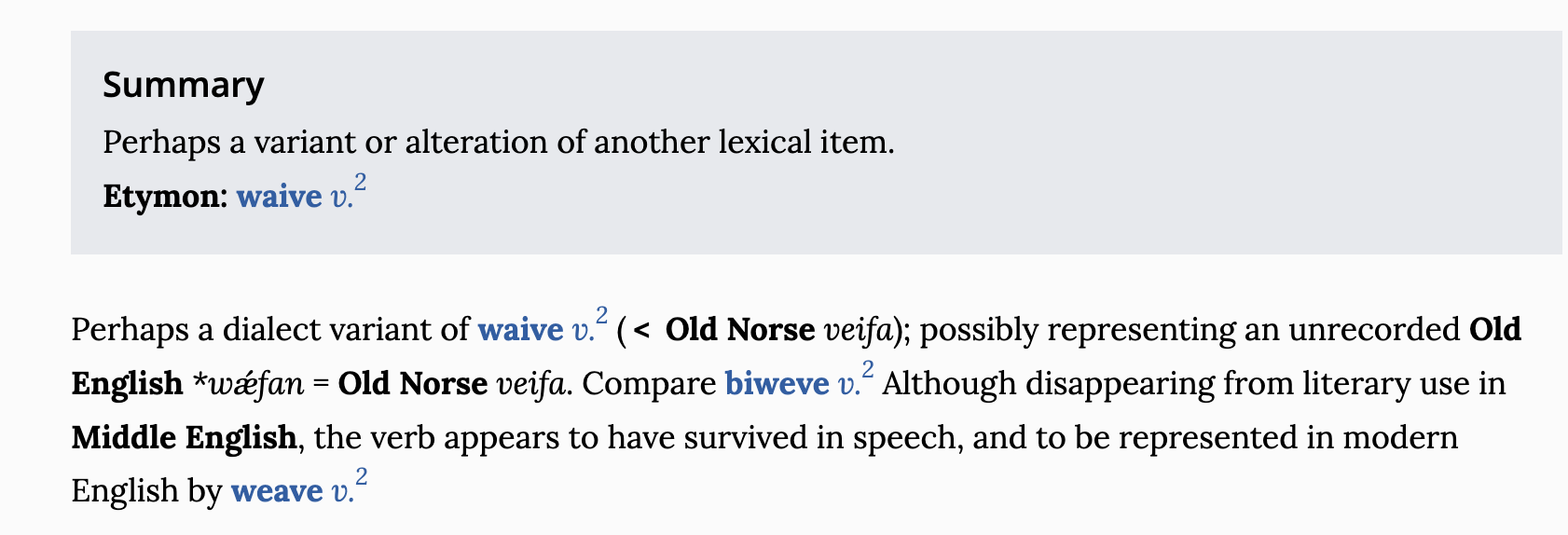Where weave is from
« previous post | next post »
In a comment on "Trump's rhetorical 'weave'", J.R. Brewer wrote:
This thread has had the side effect of causing me to learn (at least taking wiktionary at face value and not digging deeper into other reference sources) that the "weave" of "bob and weave" etc. is a homophone etymologically unrelated to the "weave" meaning "create fabric from fibers" rather than the former being, as I had naively supposed, a metaphorical extension of the latter that had somehow drifted semantically to the point that it was no longer particularly obvious.
Below, some etymological backup from the Oxford English Dictionary…
For the transitive verb weave, glossed as "To form or fabricate (a stuff or material) by interlacing yarns or other filaments of a particular substance in a continuous web; to manufacture in a loom by crossing the threads or yarns called respectively the warp and the weft", the OED give this etymology:
For the intransitive verb weave, glossed as "To move repeatedly from side to side; †to toss to and fro; to sway the body alternately to one side and the other; to pursue a devious course, thread one's way amid obstructions.", the OED indeed has a different source:
For that (obsolete) intransitive verb weve, the OED give this etymology:
The full list of OED glosses for weve is
- Of persons: To go from one place to another; to travel, wander, pass.
- Of things: To go, pass, make way.
- To move to and fro; to toss about.
- To move or remove from one place to another; to convey or bring; to strike down.
- To wave or brandish (a weapon). Also to beckon, make signals.
- To toss about, trouble.
This cluster of concepts is arguably a better metaphor for Donald Trump's rhetorical "weave" than a weaver's loom is.
Beyond waive, there are also possible links to wave, whiff, waft, and waif — which associatively enrich the metaphor, even if the etymologies are uncertain.



John Swindle said,
September 6, 2024 @ 7:16 am
Float like a butterfly, sting like a bee. For Muhammad Ali it was physical, in the boxing ring. For our Donald it's moral, weaving from untruth to untruth.
F said,
September 6, 2024 @ 9:23 am
Huh! I imagined Donald's weave as consisting of several threads moving together with the rhetorical focus shifting from one to another. (Similar to how when a cop stops you on the highway and tells you you're weaving, it's because you're threading your car in between the others moving in the same direction.) But I suppose both of those are more of a braid.
F said,
September 6, 2024 @ 9:41 am
I guess "spinning a yarn" also involves a number of parallel fibers uniting into one.
GeorgeW said,
September 6, 2024 @ 9:55 am
I think Trump's 'weave' metaphor is more related to bringing different ideas (threads) together into a cohesive and comprehensible whole.
Warp & Weft said,
September 6, 2024 @ 10:03 am
The process of weaving fabric very much involves movement from side to side, so the word origins may still be related (there seems to be a lot of heavy lifting being done by that "perhaps" and "possibly" under weve, but my background is much stronger in fiber arts than linguistics)
J.W. Brewer said,
September 6, 2024 @ 12:50 pm
@W&W yes my naive folk-etymology prior assumption about how weaving in the fabric sense had given rise to the weaving side-to-side image somehow involved the shuttle on an old-fashioned manually-operated loom going back and forth perpendicular to the "forward progress" of the cloth being woven. But I am accepting that this was mistaken on my part.
Haamu said,
September 6, 2024 @ 3:18 pm
The original NYT article that kicked off the other thread states
but I don't see anything shading towards deviousness in the quoted glosses. (I don't subscribe to OED and can't check it myself.)
John Swindle said,
September 7, 2024 @ 11:03 am
@Haamu: I don't subscribe to OED either, but I read "a devious course" in that definition as a course that wanders, not necessarily implying deception.
Y said,
September 7, 2024 @ 2:05 pm
Compare the unrelated homophones policy, 'insurance contract' and 'principles of action in specific circumstances'.
Yves Rehbein said,
September 7, 2024 @ 2:28 pm
@GeorgeW, why is it "Trump's 'weave' metaphor"? I recall he was "urged to stop" and then justified his "weave". I assume he picked it up because the word was used in telling him, so he does what anyone does acquirinf a new symbol, take it out for a spin. The metaphor he reaches is equivalent to join loose ends, but the explanation of how it works is simply that he does it "a lot" and I'm worried he'd spell that alot.
It isn't descriptive of his rhetorics but it matches the minimal concept of MERGE in constructivist linguistics. Technically that makes it not even wrong.
Warp & Weft above claims correctly that unknown origin does not support the statement of etymologies being unrelated. J. W. Brewer's reference to "bob and weave" in the previous thread imediately recalls bobin from Wartburg's notes on *scamnium, cf. Französisches Etymologisches Wörterbuch 11, 277, "benennung der garnhaspel", "Vgl. wegen der bedeutung und wegen des geschlechtes npr. banco „table qui porte les bobines, dans les filatures“.
But it also reminds me of Dutch boven "above" because when I spoke of high vowels I definitely had PIE *wi- in mind, such that bob and weave sounds a lot like to and fro, to have had one's ups and downs. If this is correct, Trumps weave is not far from gainsay or uptalk.
I could also see a couple more positive connotations. Berchta for example is known as tutelary diety, a matron of places where weaving takes place (in Grimm's Mythologie). That appears to be an honorable role to play. And I'd assume that fabricants act as traveling salesmen a lot, but my only piece of evidence is the dope fiend in the Wire selling whities out of a shopping cart. The White Lady myth, with which Berhta may be associated if the name means "bright", also speaks of a traveling matrone who dubs the people, literally drowning slaves in a pond. White dress may be associated with purity. I could argue this point until the sun comes up.
cameron said,
September 7, 2024 @ 5:23 pm
Trump's "I do the weave" usage might have been informed or influenced by the use of the term "weave" in the jargon of basketball. If Trump played basketball in school he might very well have been trained to run the "three man weave".